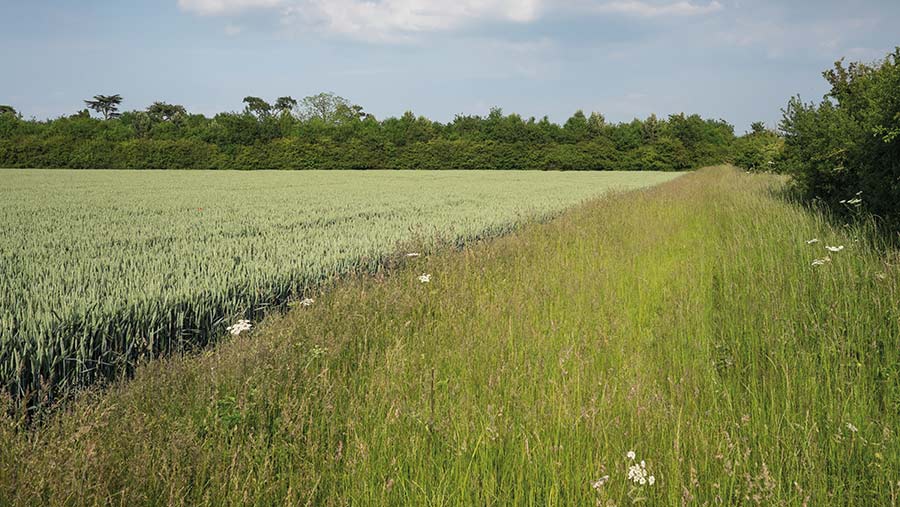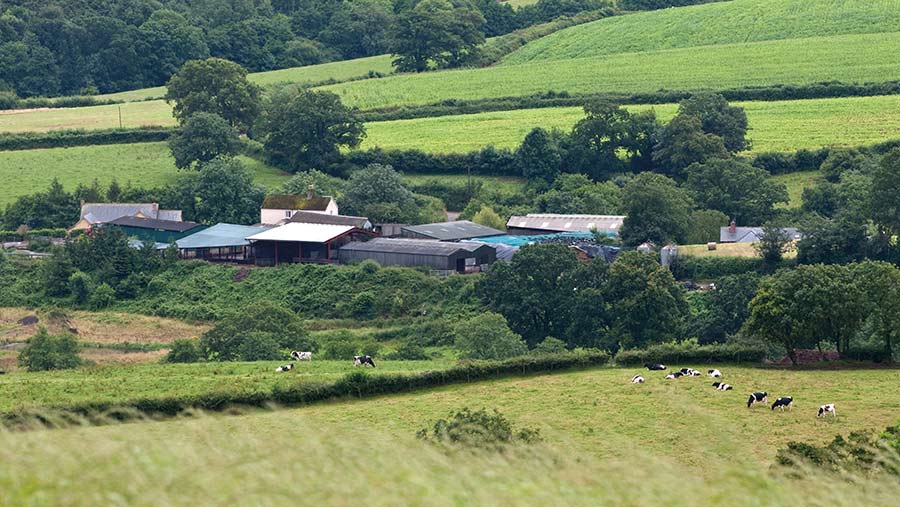Survey uncovers lack of detail on farm payment plans
 © Tim Scrivener
© Tim Scrivener Farmers are keen to deliver the government’s vision for a greener countryside – but desperately need more details to do so successfully.
The stark warning follows a Farmers Weekly survey examining the future of farm support for agriculture – including re-focusing payments to reward growers and livestock producers for undertaking environmental work.
The Future of Farm Payments survey was undertaken for the launch of a new Farmers Weekly initiative to help farmers secure a more financially and environmentally sustainable future for their businesses.
Most farmers say they would be happy to be rewarded for improving and protecting the environment. But the vast majority also said they need more information about future government schemes – and how much they will be paid.
The survey comes as the government pushes ahead with the phase-out of the Basic Payment Scheme (BPS) in England. Environmental payments are seen as a key way for farmers to recoup at least some of the lost BPS income.
See also: Environmental Land Management scheme – what we know so far
More detail needed
Although BPS payments are being retained for the time being in Scotland, Wales and Northern Ireland, some 92% of farmers across the UK said they lacked enough information from their government about future support for agriculture.
“Fewer than one in 10 farmers feel they have the information they need to make the sort of changes that Defra wants to see,” said survey analyst Heather Macleod.
As well as Defra, the Scottish and Welsh governments are also examining initiatives that would encourage more farmers to enhance and protect the environment. But a huge information gap must be filled for that ambition to be realised.
Some 59% of all survey respondents who aren’t already doing so said they would be interested in measures to encourage biodiversity. This increased to 69% for improving water and 74% for air – and higher still for mitigating climate change (75%).
But many respondents said they lacked enough information about how to achieve those goals. This included 72% who said they needed more detail on biodiversity measures, the same percentage for water, and 85% for air.
Climate change
Perhaps most worryingly, 91% of respondents said they needed more information on climate change mitigation – seen as a key way for farmers to help the UK meet its climate change target of reaching net-zero carbon by 2050.
“Respondents are most interested in being rewarded for adaptation to climate change, clean air and protection from pollution,” said Ms Macleod. “But these are precisely the areas where information is lacking.”
Industry leaders and business consultants agree that much more detail is needed for farmers to make informed decisions about how they plan for the future and implement any environmental measures.
Payment rates already announced are too low to be attractive for some farmers. These include rates of up to £70/ha for measures designed to improve soil health under Defra’s Sustainable Farming Incentive (see panel).
Cumbria cereal and grassland farmer Vaughan Hodgson said he had examined details of the SFI announced last month. But they were vague and unlikely to make up the income lost as the BPS is phased out.
How to prepare
Farm business consultant George Badger, of Ceres Rural, said farmers in England would lose about £230/ha as the BPS was withdrawn. “We are not expecting the SFI to replace all of that, but I would be looking for it to replace about half,” he suggested.
Jonathan Armitage, head of farming at Strutt & Parker, said it was important for farmers to prepare for the future by undertaking a full appraisal of their business – and decide whether joining schemes such as the SFI would be worthwhile.
“Some of those options are going to be relatively straightforward to deal with – and relatively cheap to deliver with reasonable payment rates,” said Mr Armitage. “Some of them are going to be more complex and more expensive.”
The survey of 717 farmers was conducted by Macleod Research on behalf of Farmers Weekly during May and June 2021. Average farm size was 281ha. The average age of respondents was 57 years old.
Some 74% of respondents were owner-occupiers, with 18% tenant farmers. In terms of country, 84% were from England, 7% from Wales, 6% from Scotland and 3% from Northern Ireland.
Mixed views on flagship environment scheme

© Tim Scrivener
Almost 60% of farmers in England say they are interested in joining Defra’s forthcoming Environmental Land Management (ELM) scheme.
The flagship scheme is due to be fully up and running in 2024. But an entry-level version – the Sustainable Farming Incentive (SFI) – is expected to open for applications next year. Some 2,000 farmers have already been invited to join a pilot SFI this autumn.
Some 58% of survey respondents said they were interested in joining ELM generally. But this rose to almost 70% when asked if they would be interested in joining the SFI specifically – which will encourage environmentally sustainable land management.
Enthusiasm among farmers for the fledgling SFI will please Defra, which has set a target for 70% of growers and livestock producers to eventually join the scheme. But much will depend on scheme options and payment rates.
Announced early this summer, the first SFI measures will include a special focus on improving soil health. These will feature options to improve arable soils, grassland soils and reverse soil erosion and degradation.
Defra secretary George Eustice confirmed last month that farmers will be paid up to £70/ha for looking after their soil. Doing so will also increase soil organic content – and help the UK meet net zero targets, he said.
The payment rates roughly equate to a 30% uplift on what would have been the case using old EU methodology, says Defra. Other SFI options are due to be announced at a later date, it says.
But it is already clear that income from the SFI alone will not be enough for many farmers to replace income lost as BPS is phased out. This means farmers will have to look for other sources of revenue.
The SFI is only one element of ELM. Further components will include the mid-tier Local Nature Recovery and higher-tier Landscape Recovery schemes – both of which will be piloted next year.
Some 51% of farmers said they would interested in being rewarded for actions that encourage local nature recovery; while 21% said they would be interested in long term landscape recovery projects, including rewilding where appropriate.
Trade deals mustn’t undermine standards, say farmers
Growers and livestock producers say their efforts to enhance the environment while producing food must not be undermined by cheap imports.
The need to protect farmers from food imports produced using methods that would be illegal in the UK was highlighted repeatedly by respondents to the Farmers Weekly Future of Farm Payments survey.
This included production methods that involved environmental destruction overseas – as well as livestock production methods that are banned in the UK, such as hormone-treated beef and chlorinated chicken.
Farmers said it was unfair of the government to expect them to produce food to high standards in the UK and then sign trade deals that opened the British market to imports of environmentally damaging food.
The findings echo a OnePoll consumer survey carried out for the NFU in June. It found that 85% of people want future trade deals to protect UK farmers from being undercut by cheaper, sub-standard food.
Some 84% of the OnePoll respondents said trade deals should ensure environmental farming standards for imports match those of the UK, with 86% saying animal welfare standards should also be equal.
Are you being financially rewarded for encouraging the following? |
|||
| Yes (%) | No, but I would like to be (%) | Neither (%) | |
| Clean and plentiful water | 7 | 68 | 25 |
| Clean air | 1 | 74 | 25 |
| Mitigating pollution | 4 | 73 | 23 |
| Mitigating climate change | 2 | 75 | 23 |
| Encouraging biodiversity and wildlife | 28 | 59 | 13 |
| Beauty, heritage and public engagement | 6 | 50 | 44 |
| Source: Farmers Weekly | |||
Do you have enough information to improve the following on your farm? |
||
| Yes (%) | No (%) | |
| Water quality | 28 | 72 |
| Air quality | 15 | 85 |
| Biodiversity | 28 | 72 |
| Carbon storage | 9 | 91 |
| Public access | 37 | 63 |
| Cultural heritage | 25 | 75 |
| Soil health | 48 | 52 |
| Source: Farmers Weekly | ||
Messages from farmers to the government
- “Tell us what is happening and when and what we will get paid for.”
- “We need greater specificity about future grant funding – including values.”
- “Public money for public goods must be costed at commercial rates, not income forgone.”
- “Plans are vague, but going to be shortly introduced. This is not ideal.”
- ”Produce realistic environmental schemes, that can work, with realistic funding.”
Source: Future of Farm Payments Survey, Farmers Weekly, 2021
